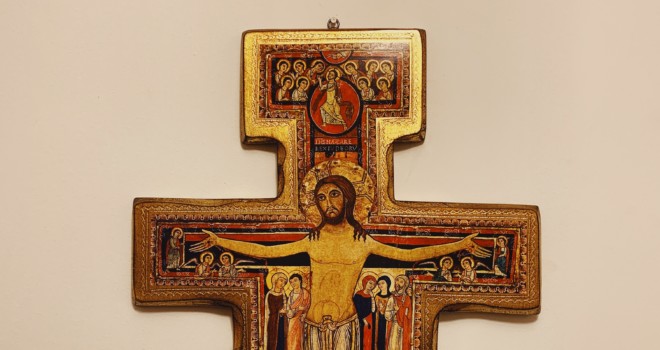Revelation 3:20 paints an enduring image of what it’s like when Christ comes to our hearts.
Behold, I stand at the door and knock. If anyone hears my voice and opens the door, then I will enter his house and dine with him, and he with me.
These words form the basis for the beginning of Mother Teresa’s “I Thirst” meditation, in which Christ confirms His yearning for the soul:
It is true. I stand at the door of your heart, day and night. Even when you are not listening, even when you doubt it could be Me, I am there: waiting for even the smallest signal of your response, even the smallest suggestion of an invitation that will permit Me to enter.
In the scene depicted in Revelation, it is significant that the door is closed, as one nineteenth century commentator notes. The door leads to our heart. The closed door does not deter Christ coming to us, but He does ask for our permission before entering. Here is how the commentator imagines the scene:
[W]e see the fast shut door, with rusted hinges, all overgrown with rank, poisonous weeds, which tell how long it has been closed. There stands, amid the night dews and the darkness, the patient Son of man, one hand laid on the door, the other bearing a light, which may perchance flash through some of its chinks. In His face are love repelled, and pity all but wasted; in the touch of His hand are gentleness and authority.
Christ knocks and speaks. Another commentary identifies the knocks with the hardships of life. Rather than withdraw into ourselves, Christ speaks, calling us to openness towards Him. Note that in this instance it matters less what He says than that His voice is heard. We only need to respond to the reality of the Word Incarnate’s presence. His voice is enough to awaken our hearts (see, for example, John 10:27).
Here we see an intriguing reversal of what Jesus
says in the gospels. There, he tells us that if we ask, we will receive. He
uses the analogy of a closed door: knock and it will be opened He says (see,
for example, Luke 11:9).
In Revelation, Christ is telling us that it is He who first comes seeking us.
It is He who first comes knocking on our door.
What Christ is seeking is intimate communion with
us. This becomes apparent when we see the link between this passage and the
Song of Songs:
I was sleeping, but my heart was awake.
The sound of my lover knocking!
“Open to me, my sister, my friend,
my dove, my perfect one!
For my head is wet with dew,
my hair, with the moisture of the night.”
I have taken off my robe,
am I then to put it on?
I have bathed my feet,
am I then to soil them?
My lover put his hand in through the opening:
my innermost being trembled because of him.
I rose to open for my lover,
my hands dripping myrrh:
My fingers, flowing myrrh
upon the handles of the lock.
I opened for my lover—
but my lover had turned and gone!
At his leaving, my soul sank.
I sought him, but I did not find him;
called out after him, but he did not answer me
(Song of Songs 5:2-6; I’m particularly indebted to my Father G.K. Beale’s commentary on Revelation for helping me to see the connection).
Here the story has a tragic ending. In reading this,
we surely do not want to become like the tardy bride, slow to answer the door.
But Father Blaise Arminjon, S.J., a contemporary commentator, sees a hopeful
message in the text. The suffering His absence causes will “purify her
completely,” thus preparing her for “true love and union” (see The Cantata of
Love, 251).
Perhaps we could expand upon this insight: in
withdrawing His presence Christ stirs us to yearn for Him ever more. He wants
us to experience the kind of intense longing that only arises when searching
for something or Someone who is loved but gone. This is the conclusion of
several church fathers. St. Gregory the Great says the delay gives the bride a
“renewed ardor” and increases her “capacity for God.” “God, by making us wait,
stretches desire,” adds St. Augustine. Again, St. Gregory of Nyssa sees a
similar dynamic: “God wants the delay in pleasure to set afire the desire” (as
cited in The Cantata of Love, 252).
It is interesting that the bride’s hands are
immersed in myrrh. In the gospels, this symbolizes Jesus’ suffering and death.
Myrrh was among the three gifts from the wise men and it was mixed with wine
and offered to Him on the cross. Later in the chapter in Song of Songs, the
bride becomes wounded by the watchmen of the city. Our initial encounter with
Christ opens our hearts to Him, but then leads to pain as we are not able to
fully enjoy His presence, causing us to become wounded, as St. John of the
Cross writes.
In the Song of Songs, the bride does reunite with
the bridegroom. In her meditation, Mother Teresa offers us assurance that
Christ will again come knocking for us too:
I want you to know that each time you invite Me, I do come always, without fail. Silent and invisible I come, yet with a power and a love most infinite, bringing the many gifts of My Spirit. I come with My mercy, with My desire to forgive and heal you, with a love for you that goes beyond your comprehension.
✠













